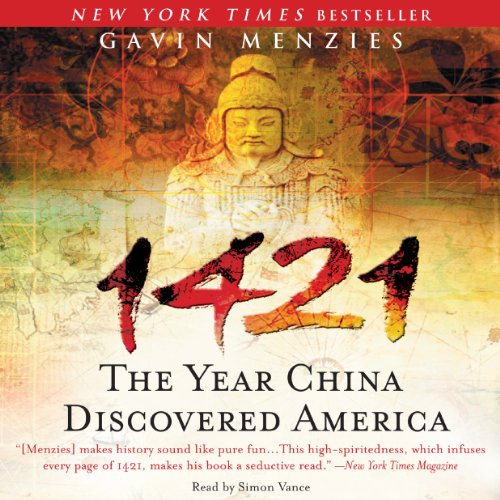
In '1421', Gavin Menzies embarks on a sweeping odyssey, challenging the very bedrock of historical orthodoxy. Proposing a radical reimagining of the cartographic landscape of the 15th century, Menzies posits that it was the Chinese, rather than Columbus or Magellan, who first navigated the unknown expanses of the world's oceans. The narrative is a rich tapestry of maritime prowess, geopolitics, and arcane exploration, all meticulously pieced together with a blend of dogged investigation and enlightened speculation. Menzies crafts a compelling argument, one that invites readers to interrogate accepted truths and to wade, with unabashed curiosity, into the murky waters of historical revisionism. Whether one emerges as a staunch advocate or a skeptical critic, there's no denying the incandescent brilliance of Menzies' audacious hypothesis.
On March 8, 1421, the largest fleet the world had ever seen set sail from China. Its mission was to "proceed all the way to the ends of the earth to collect tribute from the barbarians beyond the seas" and unite the whole world in Confucian harmony.
When it returned in October 1423, the emperor had fallen, leaving China in political and economic chaos. The great ships were left to rot at their moorings and the records of their journeys were destroyed. Lost in China's long, self-imposed isolation that followed was the knowledge that Chinese ships had reached America 70 years before Columbus and had circumnavigated the globe a century before Magellan. Also concealed was how the Chinese colonized America before the Europeans and transplanted in America and other countries the principal economic crops that have fed and clothed the world.
Unveiling incontrovertible evidence of these astonishing voyages, 1421 rewrites our understanding of history. Our knowledge of world exploration as it has been commonly accepted for centuries must now be reconceived due to this landmark work of historical investigation.
No referrals for this listing
1421: The Year China Discovered America
Are you sure you want to delete this listing?
All related data including comments will be permanently deleted.
Yes, please delete




